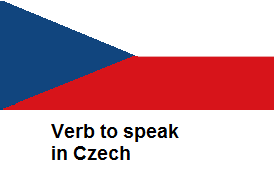Difference between revisions of "Language/Czech/Grammar/Verb-to-speak-in-Czech"
(Verb to speak in Czech) |
m (Quick edit) |
||
| (16 intermediate revisions by 4 users not shown) | |||
| Line 1: | Line 1: | ||
[[File:Verb to speak in Czech.png|alt=Verb to speak in Czech|thumb | [[File:Verb to speak in Czech.png|alt=Verb to speak in Czech|thumb]]Here's a lesson on how to conjugate the verb "mluvit" (to speak) in Czech: | ||
. | In Czech, the verb "mluvit" means "to speak." Like in any language, the verb changes depending on the subject and tense of the sentence. Here's how to conjugate it: | ||
. | <span link>Take a moment to explore these relevant pages as you conclude this lesson:</span> [[Language/Czech/Grammar/Possessive-Case-in-Czech|Possessive Case in Czech]], [[Language/Czech/Grammar/Instrumental-Case-in-Czech|Instrumental Case in Czech]], [[Language/Czech/Grammar/Introduction-to-Adjectives|Introduction to Adjectives]] & [[Language/Czech/Grammar/Modal-Verb-(Must)-in-Czech|Modal Verb (Must) in Czech]]. | ||
== Present tense: == | |||
* Já mluvím (I speak) | |||
* Ty mluvíš (you speak, informal) | |||
* On/ona/ono mluví (he/she/it speaks) | |||
* My mluvíme (we speak) | |||
* Vy mluvíte (you speak, formal or plural) | |||
* Oni/ony/ona mluví (they speak) | |||
== Past tense: == | |||
* Já jsem mluvil/mluvila (I spoke) | |||
* Ty jsi mluvil/mluvila (you spoke, informal) | |||
* On/ona/ono mluvil/mluvila (he/she/it spoke) | |||
* My jsme mluvili/mluvily (we spoke) | |||
* Vy jste mluvili/mluvily (you spoke, formal or plural) | |||
* Oni/ony/ona mluvili/mluvily (they spoke) | |||
== Future tense: == | |||
* Já budu mluvit (I will speak) | |||
* Ty budeš mluvit (you will speak, informal) | |||
* On/ona/ono bude mluvit (he/she/it will speak) | |||
* My budeme mluvit (we will speak) | |||
* Vy budete mluvit (you will speak, formal or plural) | |||
* Oni/ony/ona budou mluvit (they will speak) | |||
== Imperative (command form): == | |||
* Mluv! (Speak!, informal) | |||
* Mluvte! (Speak!, formal or plural) | |||
It's important to note that Czech has two grammatical genders, masculine and feminine, and the forms of the verb change depending on the gender of the subject. For example, "he speaks" is "on mluví" and "she speaks" is "ona mluví." In the plural form, the gender is determined by the majority of the group. If there are both masculine and feminine subjects in the group, the masculine form is used. | |||
. | |||
. | That's a basic overview of how to conjugate the verb "mluvit" in Czech. As with any language, practice makes perfect, so try using these forms in different sentences to get more comfortable with them. | ||
==Other Lessons== | |||
* [[Language/Czech/Grammar/Indefinite-articles-in-Czech|Indefinite articles in Czech]] | |||
* [[Language/Czech/Grammar/How-to-use-the-Modal-Verb-(Can)|How to use the Modal Verb (Can)]] | |||
* [[Language/Czech/Grammar/Prepositions|Prepositions]] | |||
* [[Language/Czech/Grammar/Instrumental-Case-in-Czech|Instrumental Case in Czech]] | |||
* [[Language/Czech/Grammar/Comaratives-and-Superlatives|Comaratives and Superlatives]] | |||
* [[Language/Czech/Grammar/Conditional-Mood|Conditional Mood]] | |||
* [[Language/Czech/Grammar/Verb-to-be-with-names-and-places|Verb to be with names and places]] | |||
* [[Language/Czech/Grammar/Future-Tense|Future Tense]] | |||
* [[Language/Czech/Grammar/Accusative-Case-in-Czech|Accusative Case in Czech]] | |||
* [[Language/Czech/Grammar/Pronouns|Pronouns]] | |||
<span links></span> | |||
Latest revision as of 23:12, 26 March 2023
Here's a lesson on how to conjugate the verb "mluvit" (to speak) in Czech:
In Czech, the verb "mluvit" means "to speak." Like in any language, the verb changes depending on the subject and tense of the sentence. Here's how to conjugate it:
Take a moment to explore these relevant pages as you conclude this lesson: Possessive Case in Czech, Instrumental Case in Czech, Introduction to Adjectives & Modal Verb (Must) in Czech.
Present tense:[edit | edit source]
- Já mluvím (I speak)
- Ty mluvíš (you speak, informal)
- On/ona/ono mluví (he/she/it speaks)
- My mluvíme (we speak)
- Vy mluvíte (you speak, formal or plural)
- Oni/ony/ona mluví (they speak)
Past tense:[edit | edit source]
- Já jsem mluvil/mluvila (I spoke)
- Ty jsi mluvil/mluvila (you spoke, informal)
- On/ona/ono mluvil/mluvila (he/she/it spoke)
- My jsme mluvili/mluvily (we spoke)
- Vy jste mluvili/mluvily (you spoke, formal or plural)
- Oni/ony/ona mluvili/mluvily (they spoke)
Future tense:[edit | edit source]
- Já budu mluvit (I will speak)
- Ty budeš mluvit (you will speak, informal)
- On/ona/ono bude mluvit (he/she/it will speak)
- My budeme mluvit (we will speak)
- Vy budete mluvit (you will speak, formal or plural)
- Oni/ony/ona budou mluvit (they will speak)
Imperative (command form):[edit | edit source]
- Mluv! (Speak!, informal)
- Mluvte! (Speak!, formal or plural)
It's important to note that Czech has two grammatical genders, masculine and feminine, and the forms of the verb change depending on the gender of the subject. For example, "he speaks" is "on mluví" and "she speaks" is "ona mluví." In the plural form, the gender is determined by the majority of the group. If there are both masculine and feminine subjects in the group, the masculine form is used.
That's a basic overview of how to conjugate the verb "mluvit" in Czech. As with any language, practice makes perfect, so try using these forms in different sentences to get more comfortable with them.
Other Lessons[edit | edit source]
- Indefinite articles in Czech
- How to use the Modal Verb (Can)
- Prepositions
- Instrumental Case in Czech
- Comaratives and Superlatives
- Conditional Mood
- Verb to be with names and places
- Future Tense
- Accusative Case in Czech
- Pronouns
